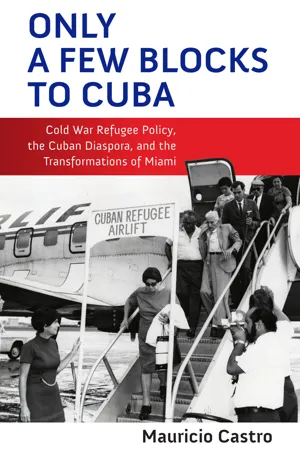
Only a Few Blocks to Cuba
Cold War Refugee Policy, the Cuban Diaspora, and the Transformations of Miami
- 1 pages
- English
- ePUB (mobile friendly)
- Available on iOS & Android
Only a Few Blocks to Cuba
Cold War Refugee Policy, the Cuban Diaspora, and the Transformations of Miami
About this book
In Only a Few Blocks to Cuba, Mauricio Castro shows how the U.S. government came to view Cuban migration to Miami as a strategic asset during the Cold War, in the process investing heavily in the city's development and shaping its future as a global metropolis.When Cuban refugees fleeing Communist revolution began to arrive in Miami in 1959, the city was faced with a humanitarian crisis it was ill-equipped to handle and sought to have the federal government solve what local politicians clearly viewed as a Cold War geopolitical problem. In response, the Eisenhower and Kennedy administrations, and their successors, provided an unprecedented level of federal largesse and freedom of transit to these refugees. The changes to the city this investment wrought were as impactful and permanent as they were unintended. What was meant to be a short-term geopolitical stratagem instead became a new reality in South Florida. A growing and increasingly powerful Cuban community contested their place in Miami and navigated challenges like bilingualism, internal political disputes, socioeconomic polarization, and ongoing struggles and negotiations with Washington and Havana in the decades that followed. This contested process, argues Mauricio Castro, not only transformed South Florida, but American foreign policy and the calculus of national politics.Castro uses extensive archival research in local and national sources to demonstrate that the Cuban diaspora and Cold War refugee policy made South Florida a key space to understanding the shifting landscape of the late twentieth century. In this way, Miami serves as an example of both the lived effects of defense spending in urban spaces and of how local communities can shape national politics and international relations. American politics, foreign relations, immigration policy, and urban development all intersected on the streets of Miami.
Frequently asked questions
- Essential is ideal for learners and professionals who enjoy exploring a wide range of subjects. Access the Essential Library with 800,000+ trusted titles and best-sellers across business, personal growth, and the humanities. Includes unlimited reading time and Standard Read Aloud voice.
- Complete: Perfect for advanced learners and researchers needing full, unrestricted access. Unlock 1.4M+ books across hundreds of subjects, including academic and specialized titles. The Complete Plan also includes advanced features like Premium Read Aloud and Research Assistant.
Please note we cannot support devices running on iOS 13 and Android 7 or earlier. Learn more about using the app.
Information
Table of contents
- Cover
- Half Title
- Series Page
- Title Page
- Copyright
- Dedication
- Contents
- A Note on Terms
- Introduction. “The Seventh Province of Cuba”
- Chapter 1. “Our Unnoticed Neighbors”: Cuban Refugees, Community Action, and the Push for a Federal Response
- Chapter 2. “The Score”: Federal Funding, Refugee Management, and the Changing Economic Landscape of South Florida
- Chapter 3. “Second Class Citizens”: Race, Citizenship, and the Politics of Exile at the National and Local Levels
- Chapter 4. “At Home, but Homesick”: Bilingualism, Local Politics, and the Divided Politics of Cuban Miami
- Chapter 5. “Will the Last American to Leave Miami Please Bring the Flag?”: The Mariel Boatlift, Backlash, and the Politics of Image in Miami
- Chapter 6. “A Crisis in Clout”: The Maturation of Cuban American Politics, the Cuban Lobby, and the Limits of Influence
- Epilogue. “We’ll Be Back in Cuba in Six Months”
- Archives, Collections, and Oral History Sources
- Notes
- Index
- Acknowledgments